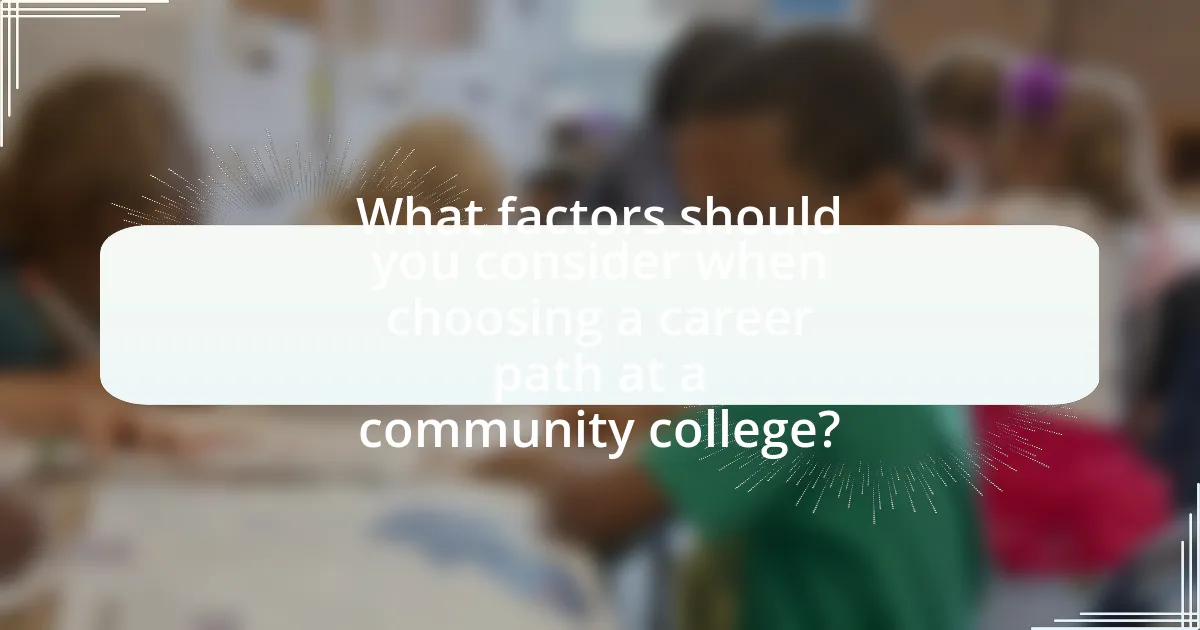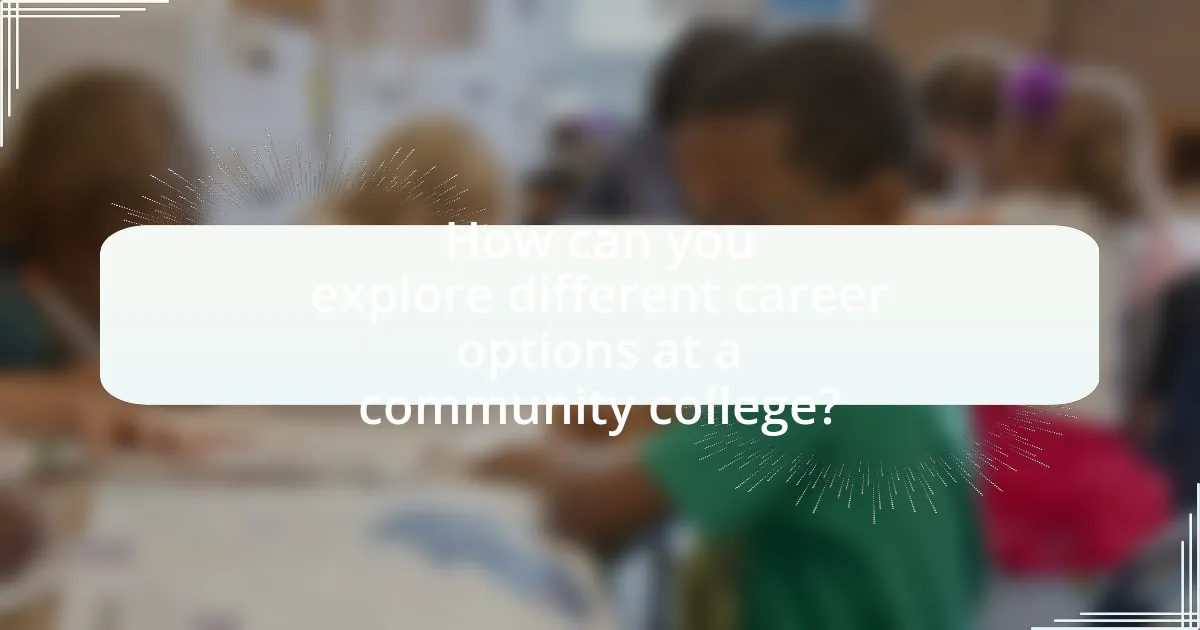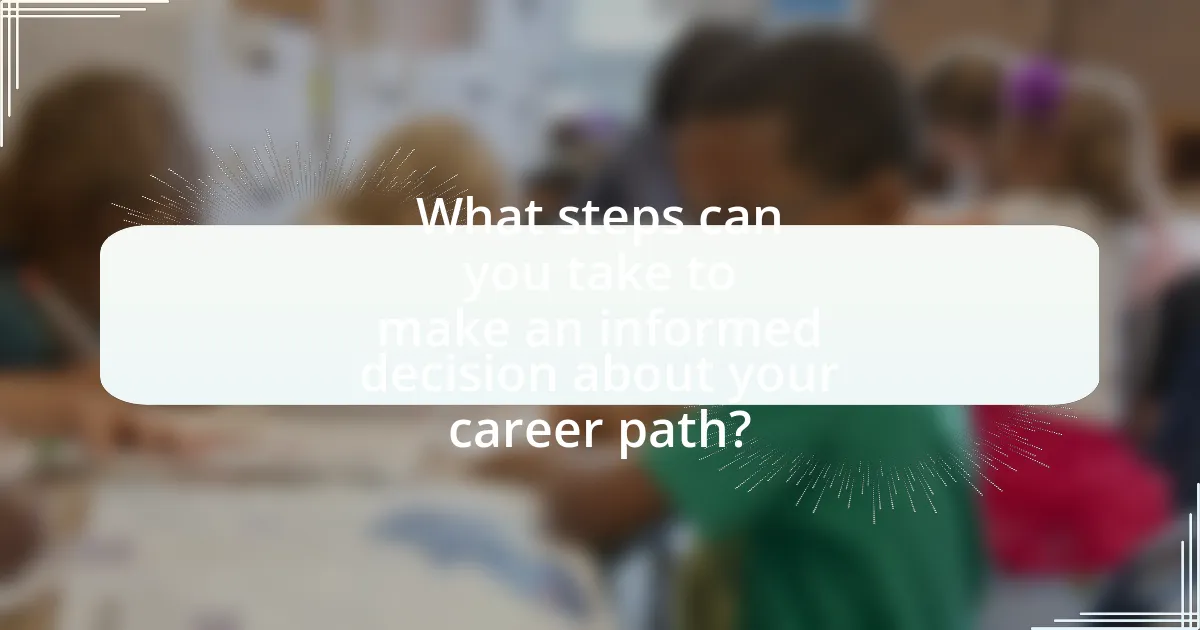Choosing the right career path at a community college involves several critical factors, including personal interests, job market demand, and program availability. The article outlines methods for identifying interests and assessing skills, emphasizing the importance of aligning these with potential career options. It also highlights the significance of researching job market trends and utilizing community college resources, such as career counseling and internships, to explore various career paths. Additionally, the article discusses common pitfalls to avoid and practical strategies to enhance motivation during the career search process, ultimately guiding students toward informed and fulfilling career decisions.

What factors should you consider when choosing a career path at a community college?
When choosing a career path at a community college, consider personal interests, job market demand, and program availability. Personal interests guide motivation and satisfaction in a chosen field, while job market demand ensures that skills acquired will lead to employment opportunities. Program availability is crucial as it determines the specific courses and training offered, aligning with career goals. According to the U.S. Bureau of Labor Statistics, fields such as healthcare and technology are projected to grow significantly, indicating strong job market demand in those areas.
How do your interests influence your career choices?
Interests significantly influence career choices by guiding individuals toward fields that align with their passions and strengths. For instance, someone interested in technology may pursue a career in information technology or software development, as their enthusiasm for the subject can enhance motivation and job satisfaction. Research indicates that individuals who choose careers aligned with their interests are more likely to experience higher levels of engagement and success in their roles, as evidenced by a study published in the Journal of Vocational Behavior, which found that interest congruence positively correlates with job performance and satisfaction.
What are some methods to identify your interests?
To identify your interests, you can utilize methods such as self-reflection, personality assessments, and exploration of hobbies. Self-reflection involves analyzing past experiences and activities that brought joy or satisfaction, helping to pinpoint what you are passionate about. Personality assessments, like the Myers-Briggs Type Indicator or Holland Code, provide insights into your preferences and strengths, guiding you toward suitable fields. Additionally, exploring hobbies or volunteering in various areas allows for practical experience, revealing what resonates with you. Research indicates that engaging in these methods can significantly enhance self-awareness and clarify career aspirations, as noted in studies on career development by the National Career Development Association.
How can you align your interests with potential career paths?
To align your interests with potential career paths, conduct a self-assessment to identify your passions, skills, and values. This process involves reflecting on activities that energize you and the subjects you enjoy studying. Research indicates that individuals who align their careers with their interests report higher job satisfaction and engagement, as shown in a study by the National Career Development Association, which found that 70% of people who pursued careers aligned with their interests felt fulfilled in their roles. By matching your interests with career options, you can explore fields that resonate with you, leading to more meaningful and successful career choices.
What role do skills and strengths play in career selection?
Skills and strengths are critical factors in career selection as they directly influence an individual’s ability to succeed and find satisfaction in their chosen profession. When individuals assess their skills, such as technical abilities or interpersonal communication, they can identify careers that align with their competencies, increasing the likelihood of job performance and fulfillment. Research indicates that individuals who choose careers based on their strengths are more likely to experience job satisfaction and lower turnover rates. For example, a study by the Gallup Organization found that employees who use their strengths daily are six times more likely to be engaged at work. This evidence underscores the importance of aligning career choices with personal skills and strengths to enhance both professional success and personal happiness.
How can you assess your skills and strengths?
To assess your skills and strengths, you can utilize self-reflection, feedback from others, and formal assessments. Self-reflection involves evaluating your past experiences, identifying tasks you excelled at, and recognizing activities that energize you. Feedback from peers, mentors, or supervisors provides external perspectives on your abilities and can highlight strengths you may overlook. Formal assessments, such as skills inventories or personality tests, offer structured insights into your competencies and preferences. Research indicates that individuals who engage in these methods are more likely to make informed career decisions, as they align their strengths with suitable career paths.
What careers align with specific skills and strengths?
Careers align with specific skills and strengths by matching individual capabilities to job requirements. For example, individuals with strong analytical skills may excel in careers such as data analysis, finance, or engineering, where problem-solving and critical thinking are essential. Those with excellent communication skills often thrive in fields like marketing, public relations, or education, where conveying information effectively is crucial. Additionally, creative individuals may find fulfillment in careers such as graphic design, writing, or advertising, where innovation and originality are valued. Research indicates that aligning skills with career choices leads to higher job satisfaction and performance, as individuals are more likely to engage in work that resonates with their strengths.
Why is it important to research job market trends?
Researching job market trends is crucial for making informed career decisions. Understanding these trends helps individuals identify in-demand skills and occupations, which can lead to better job prospects and higher earning potential. For instance, the U.S. Bureau of Labor Statistics projects that healthcare and technology sectors will see significant growth, indicating a strong demand for professionals in these fields. By aligning educational choices with these trends, community college students can enhance their employability and ensure they are prepared for the evolving job landscape.
What resources can help you understand job market trends?
Labor market information websites, such as the Bureau of Labor Statistics (BLS) and state labor departments, provide comprehensive data on job market trends. These resources offer statistics on employment rates, job growth projections, and wage information across various industries. For instance, the BLS publishes the Occupational Outlook Handbook, which details job outlooks and necessary qualifications for numerous occupations, helping individuals make informed career decisions. Additionally, industry reports from organizations like the National Association of Colleges and Employers (NACE) can provide insights into hiring trends and employer expectations, further aiding in understanding the job market landscape.
How do job market trends affect your career choices?
Job market trends significantly influence career choices by guiding individuals toward fields with higher demand and better job security. For instance, the U.S. Bureau of Labor Statistics projects that healthcare and technology sectors will see substantial growth, prompting many to pursue degrees in nursing or information technology. This alignment with market needs not only enhances employability but also increases potential earnings, as jobs in these areas often offer competitive salaries. Therefore, staying informed about job market trends enables individuals to make strategic decisions that align their education and skills with future employment opportunities.

How can you explore different career options at a community college?
You can explore different career options at a community college by utilizing resources such as career counseling services, workshops, and job fairs. Community colleges often provide access to career assessments that help identify your interests and strengths, guiding you toward suitable fields. Additionally, engaging with faculty and industry professionals through networking events can offer insights into various careers. According to the American Association of Community Colleges, over 80% of community colleges offer career services that include job placement assistance and internships, which further facilitate exploration of career paths.
What programs and courses are available for career exploration?
Community colleges offer various programs and courses for career exploration, including career assessment workshops, introductory courses in different fields, and certificate programs. These offerings allow students to gain insights into various professions and industries, helping them make informed decisions about their career paths. For instance, many community colleges provide career counseling services that include personality assessments and skills inventories, which guide students in identifying their strengths and interests. Additionally, programs like job shadowing and internships are often available, providing practical experience in real-world settings.
How can you utilize community college resources for career guidance?
You can utilize community college resources for career guidance by accessing career counseling services, attending workshops, and utilizing job placement programs. Community colleges often provide dedicated career centers where students can receive personalized advice, resume assistance, and interview preparation. Additionally, many institutions host career fairs that connect students with potential employers, enhancing networking opportunities. Research indicates that students who engage with career services are more likely to secure employment in their field of study, demonstrating the effectiveness of these resources in guiding career choices.
What types of workshops or events can help you explore careers?
Career exploration workshops and events include career fairs, informational interviews, job shadowing, and skills assessment workshops. Career fairs provide opportunities to meet employers and learn about various industries, while informational interviews allow individuals to gain insights from professionals in their fields of interest. Job shadowing offers firsthand experience in a specific job role, and skills assessment workshops help participants identify their strengths and interests. These activities are essential for making informed career choices, as they facilitate networking and provide practical exposure to different career paths.
How can internships and volunteer opportunities aid in career selection?
Internships and volunteer opportunities significantly aid in career selection by providing practical experience and exposure to various fields. Engaging in these activities allows individuals to explore their interests, develop skills, and understand workplace dynamics. For instance, a study by the National Association of Colleges and Employers found that 60% of interns receive job offers from their internship employers, indicating that hands-on experience can lead to employment in a chosen field. Additionally, volunteering can help individuals network with professionals, gain references, and enhance their resumes, further clarifying their career aspirations.
What are the benefits of gaining practical experience through internships?
Gaining practical experience through internships provides significant benefits, including enhanced employability and skill development. Internships allow individuals to apply theoretical knowledge in real-world settings, which improves their understanding of industry practices and workplace dynamics. According to a National Association of Colleges and Employers (NACE) survey, 60% of employers prefer candidates with internship experience, highlighting the competitive advantage that internships offer in the job market. Additionally, internships facilitate networking opportunities, enabling interns to build professional relationships that can lead to future job offers or mentorship.
How can volunteering help clarify your career goals?
Volunteering can help clarify your career goals by providing hands-on experience in various fields, allowing individuals to explore their interests and strengths. Engaging in volunteer work exposes individuals to different roles and responsibilities, which can reveal what they enjoy and excel at. For instance, a study by the Corporation for National and Community Service found that 63% of volunteers reported that their experiences helped them develop new skills relevant to their career aspirations. This practical exposure can lead to informed decisions about future career paths, as individuals gain insights into the day-to-day realities of specific professions.
What role do academic advisors play in choosing a career path?
Academic advisors play a crucial role in helping students choose a career path by providing personalized guidance based on individual interests, strengths, and academic goals. They assess students’ skills and aspirations through discussions and assessments, which helps in identifying suitable career options. Additionally, academic advisors offer information about various programs, job market trends, and potential career outcomes, enabling students to make informed decisions. Research indicates that students who engage with academic advisors are more likely to feel confident in their career choices and achieve their educational objectives, as highlighted in studies conducted by the National Academic Advising Association.
How can you effectively communicate with your academic advisor?
To effectively communicate with your academic advisor, schedule regular meetings to discuss your academic goals and progress. This proactive approach ensures that you receive timely guidance tailored to your specific needs. Prepare for these meetings by compiling questions and topics you wish to address, which demonstrates your commitment and helps the advisor provide focused advice. Additionally, actively listen during discussions and take notes to clarify any points, fostering a productive dialogue. Research indicates that students who engage in consistent communication with their advisors are more likely to achieve their academic objectives, as highlighted in a study by the National Academic Advising Association, which found that effective advising significantly enhances student success rates.
What questions should you ask your advisor about career options?
You should ask your advisor about specific career options, such as “What career paths align with my major?” This question helps identify relevant opportunities based on your academic focus. Additionally, inquire about “What skills are in demand in my field?” to understand the job market and necessary qualifications. Asking “What internships or job placements are available?” can provide practical experience that enhances employability. Furthermore, you should consider asking “What resources does the college offer for career exploration?” to access tools and support for making informed decisions. Each of these questions is designed to gather actionable insights that can guide your career planning effectively.

What steps can you take to make an informed decision about your career path?
To make an informed decision about your career path, you should conduct thorough research on potential careers, assess your interests and skills, and seek guidance from career counselors. Researching careers involves exploring job descriptions, salary expectations, and growth opportunities in various fields, which can be done through online resources and informational interviews with professionals. Assessing your interests and skills can be achieved through self-assessment tools and reflection on past experiences, helping you identify what aligns with your strengths. Seeking guidance from career counselors provides access to expert advice and resources tailored to your specific situation, enhancing your decision-making process.
How can you create a career plan based on your research?
To create a career plan based on your research, first identify your interests, skills, and values through self-assessment tools and career exploration resources. This foundational step allows you to align your personal attributes with potential career paths. Next, gather information about various occupations, including job descriptions, required qualifications, and salary expectations, using reliable sources such as the Bureau of Labor Statistics or industry-specific reports. This data will help you evaluate which careers match your profile and aspirations. Finally, set specific, measurable, achievable, relevant, and time-bound (SMART) goals for your education and career progression, ensuring that your plan is actionable and tailored to your research findings.
What elements should be included in your career plan?
A comprehensive career plan should include self-assessment, career exploration, goal setting, action steps, and evaluation. Self-assessment involves identifying personal interests, skills, and values, which can be achieved through tools like personality tests or career assessments. Career exploration requires researching potential career options, including job descriptions, required qualifications, and industry trends, to understand the landscape of available opportunities. Goal setting involves defining short-term and long-term career objectives, ensuring they are specific, measurable, achievable, relevant, and time-bound (SMART). Action steps outline the necessary steps to achieve these goals, such as enrolling in relevant courses, gaining work experience through internships, or networking with professionals in the field. Finally, evaluation is crucial for assessing progress and making adjustments to the career plan as needed, ensuring it remains aligned with evolving interests and market demands.
How often should you revisit and revise your career plan?
You should revisit and revise your career plan at least once a year. Regularly assessing your career plan allows you to adapt to changes in your interests, skills, and the job market. Research indicates that individuals who frequently update their career goals are more likely to achieve job satisfaction and career advancement. For instance, a study by the National Career Development Association found that proactive career planning significantly enhances employment outcomes.
What are some common pitfalls to avoid when choosing a career path?
Common pitfalls to avoid when choosing a career path include making decisions based solely on salary, neglecting personal interests and strengths, and failing to research job market trends. Choosing a career primarily for financial gain can lead to dissatisfaction, as studies show that job satisfaction is often linked to personal fulfillment rather than income. Ignoring one’s interests and strengths can result in a lack of engagement and motivation in the long term. Additionally, not considering job market trends can lead to pursuing careers with limited opportunities; for instance, the U.S. Bureau of Labor Statistics projects significant growth in healthcare and technology fields, indicating a need for informed decision-making based on current and future job demands.
How can you recognize and overcome indecision in your career choice?
To recognize and overcome indecision in your career choice, first identify the signs of indecision, such as feeling overwhelmed by options or experiencing anxiety about making a choice. A study by the American Psychological Association indicates that indecision can stem from fear of failure or perfectionism, which can hinder decision-making. To overcome this, engage in self-reflection to clarify your values and interests, and seek guidance from career counselors or mentors who can provide insights and support. Additionally, setting specific goals and timelines for making a decision can create a structured approach, reducing anxiety and promoting action. Research shows that individuals who actively seek information and support are more likely to make informed decisions, leading to greater satisfaction in their career paths.
What misconceptions about community college careers should you be aware of?
One misconception about community college careers is that they offer limited job prospects and lower earning potential compared to four-year degrees. In reality, many community college programs are designed to meet local workforce needs, leading to high-demand jobs in fields such as healthcare, technology, and skilled trades. For instance, according to the American Association of Community Colleges, nearly 80% of community college graduates find employment within six months of graduation, often earning competitive salaries. This demonstrates that community colleges can provide viable career pathways that are both fulfilling and financially rewarding.
What practical tips can help you choose the right career path?
To choose the right career path, start by assessing your interests, skills, and values through self-reflection and career assessments. Researching various fields and job roles can provide insight into what aligns with your strengths and passions. Networking with professionals in your areas of interest can offer real-world perspectives and guidance. Additionally, gaining practical experience through internships or volunteer work can help clarify your career preferences. According to the National Center for Education Statistics, students who engage in career exploration activities are more likely to make informed decisions about their career paths.
How can networking enhance your career exploration process?
Networking can significantly enhance your career exploration process by providing access to valuable insights and opportunities within your desired field. Engaging with professionals allows individuals to gather firsthand information about industry trends, job roles, and required skills, which can inform their career decisions. According to a survey by LinkedIn, 85% of jobs are filled through networking, highlighting its importance in uncovering hidden job opportunities. Additionally, networking can lead to mentorship relationships, where experienced professionals offer guidance and support, further aiding in the exploration of career paths.
What strategies can you use to stay motivated during your career search?
To stay motivated during your career search, set specific, achievable goals and track your progress. Establishing clear objectives, such as applying to a certain number of jobs each week or networking with a specific number of professionals, creates a sense of purpose and direction. Research indicates that goal-setting enhances motivation and performance, as outlined in the study by Locke and Latham (2002), which highlights that specific and challenging goals lead to higher performance levels. Additionally, maintaining a routine that includes dedicated time for job searching, skill development, and self-care can help sustain motivation. Engaging with support networks, such as career services at community colleges, can provide encouragement and resources, further reinforcing motivation throughout the job search process.

Leave a Reply